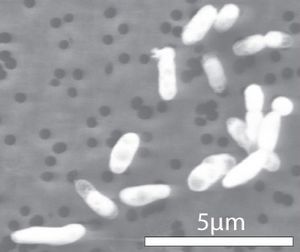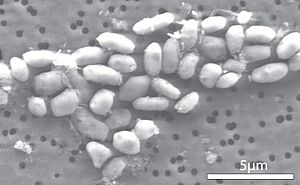Halomonadaceae facts for kids
Quick facts for kids Halomonadaceae |
|
|---|---|
 |
|
| GFAJ-1 grown on phosphorus. | |
| Scientific classification |
|
| Domain: | Bacteria |
| Phylum: | Proteobacteria |
| Class: | Gammaproteobacteria |
| Order: | Oceanospirillales |
| Family: | Halomonadaceae |
| Genera | |
|
Aidingimonas |
|
Halomonadaceae are a group of tiny living things called bacteria. They are special because they are halophilic, which means they love very salty places! Think of them as salt-loving bacteria. Scientists first identified this family in 1988. Since then, many new types of Halomonadaceae have been found. Researchers are always learning new and exciting things about them.
Contents
Meet GFAJ-1: A Special Bacterium
GFAJ-1 is a type of bacteria that belongs to the Halomonadaceae family. It's shaped like a rod and is known as an extremophile. This means it can live in very tough places!
Scientists once thought GFAJ-1 was super unique. They believed that if it didn't have phosphorus, it could use arsenic instead. Arsenic is usually a poisonous element.
The Discovery of GFAJ-1
A scientist named Felisa Wolfe-Simon found these bacteria. She collected mud from the bottom of Mono Lake in California. This lake is very salty and also very alkaline (which means it's the opposite of acidic).
She grew the bacteria in a lab. The special thing was that they grew in a dish that had arsenic in it. This made scientists wonder if the bacteria were using arsenic in a new way.
What We Learned Later
However, further research showed something different. Other scientists looked closely at the DNA of GFAJ-1. They found that there was no arsenic in its DNA. This means the bacteria still need phosphorus to live. Arsenic cannot replace phosphorus in their DNA.
Why Elements Are Important for Life
All living things, including you, are made of basic building blocks. These blocks are called elements. The main elements that make up life are carbon, hydrogen, nitrogen, oxygen, sulfur, and phosphorus.
These six elements are crucial for making important parts of cells. They form things like nucleic acids (which include DNA), proteins, and lipids (fats). These are the main parts of all living matter.
The Role of Phosphorus
Scientists believe that all life needs phosphorus. It's like a key piece of the 'backbone' that holds DNA together. DNA carries all the instructions for life. Phosphorus is also vital for ATP. ATP is a special molecule that helps cells get and use energy. It's like the energy currency of the cell.
 | May Edward Chinn |
 | Rebecca Cole |
 | Alexa Canady |
 | Dorothy Lavinia Brown |


